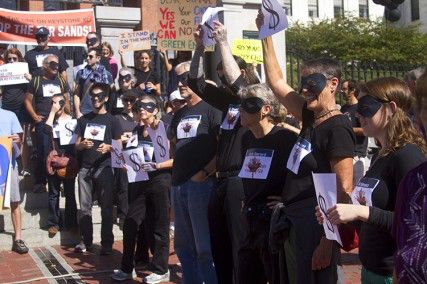
In an attempt to influence politicians before the Obama administration decides whether to approve the construction of the Keystone XL oil pipeline, about 80 people assembled in front of the Massachusetts State House Saturday to protest the plan.
The gathering, which was organized by the environmentally focused advocacy group 350 Massachusetts, featured a collection of street theater protests, with several participants dressed as major politicians and business executives in favor of the pipeline that would link Canadian oil reserves to the Gulf Coast.
“They [TransCanada, the corporation that proposed the pipeline] are trying to basically connect existing northern and southern pipelines with very little benefit for us,” said Michele Gielis, a 350 volunteer. “There have already been major spills, and essentially none of the jobs it promises will last. We felt we had to get our voice out against it, and that’s how this [protest] happened.”
The protest was one of many across the nation from 350. It included protesters dressed in black, listing the names of the “bad guys” and a literal tug-of-war between the two sides and their supporters. The protest concluded with a balloon popping, symbolizing the U.S. popping its carbon bubble and moving toward cleaner forms of energy, protesters explained.
“It seems pretty clear that if we want to stop using fossil fuels, we have to stop endorsing its development,” said Sam Grossman, 56, a resident of Lowell at the protest. “It’s not that I disapprove of the business, but this is dirty energy, and it’s pretty logical not to do this.”
Before any further action can be taken, the pipeline must be approved by the U.S. State Department, and a decision is not estimated to be made until 2014.
If approved, the project would build a 36-inch diameter tube from Alberta, Canada, heading southeast through Nebraska and finishing at endpoints in south Texas, while passing through several U.S. crude reserves in the process.
TransCanada estimates it will create approximately 9,000 construction jobs for the 1,179-mile tube, and about 7,000 jobs nationally in the manufacturing of supplies. Some jobs for monitoring and maintenance would remain after construction is complete, but most of the jobs would be temporary for the assembly, according to the website.
Since it passes through U.S. territory, the corporation would have to pay local property taxes for the land needed for the pipeline. Several national politicians, in addition to TransCanada, have advertised this possible revenue stream for a large part of the midwestern U.S., as the Republican proposal for the national budget includes a mandate for its construction.
But protestors at 350 said they doubted the revenue, while helpful, would be worth the ecological cost.
“I like Obama’s decision to delay any action, but it would be better to end it now,” said Willie O’Laughlin, 24, a resident of Weston. “We believed when he said he would have green ideology in his State of the Union [address]. We need him to know that we heard that. The uncertainty is kind of bittersweet just because he didn’t say yes, but never said no, either.”
Bil Lewis, 61, a resident of Cambridge, said he was confident that people’s voices were being heard, but he was not sure if the decision to construct or deny the pipeline project would reflect that.
“We hear it all too often, that there’s an awful lot of power in the top tier,” he said. “Things are kind of messed up that way. The government has taken notice of this message, but it may well end up we don’t get what we deserve. We may still just get what they [TransCanda executives] negotiate for us.”














































































































Billy • Sep 23, 2013 at 10:20 am
I was not aware that the Keystone pipeline went through Massachusetts.